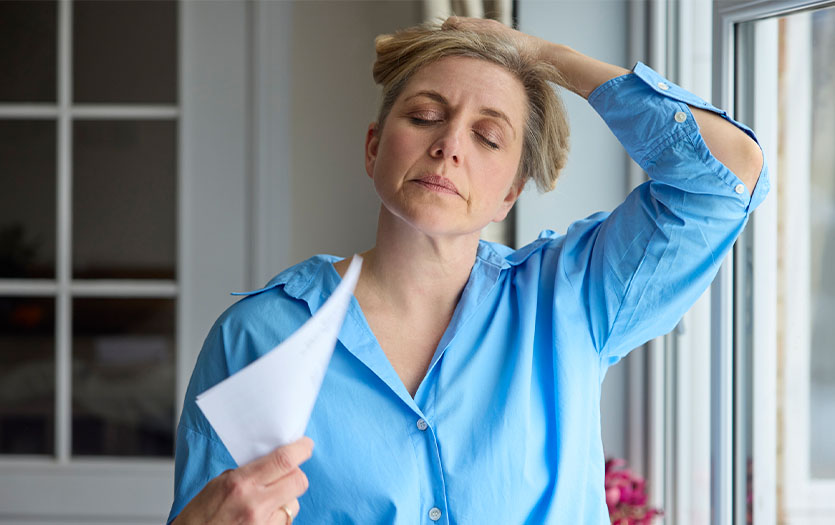
Hot flashes are a normal response to hormonal changes, often linked to menopause in women. This sudden sensation of intense body heat can be disruptive and upsetting, impacting your sleep quality and daily life. Fortunately, there are numerous effective strategies to manage these symptoms and help you find comfort.
What are hot flashes?
Hot flashes occur when the body's internal temperature regulation becomes more sensitive, usually due to changes in hormone levels. These episodes typically involve experiencing abrupt waves of heat, profuse sweating and reddening of the head, neck and chest. They can also be accompanied by mild to severe heart palpitations, anxiety, irritability and, in rare cases, panic. Hot flashes strike unexpectedly, often at night, and usually last several seconds to minutes.
What causes hot flashes?
For women, this is the most common symptom of declining estrogen levels around the time of menopause, especially in the early years. Those who begin menopause as a result of chemotherapy, surgical removal of the ovaries (oophorectomy) during hysterectomy, or antiestrogen treatment for breast cancer, are more likely to have severe hot flashes.
Hot flashes can also occur in men and may arise as a side effect of medical treatments like hormone therapy for prostate cancer, which reduces testosterone levels.
Additional causes of hot flashes include thyroid problems, other types of cancers and stress.
Managing hot flashes
For most people, hot flashes lessen or disappear after the first or second year of menopause, but for others, these symptoms can persist for several years. Managing hot flashes can be achieved through a combination of lifestyle adjustments, medical treatments and natural remedies.
Lifestyle adjustments
Certain lifestyle choices can help prevent or reduce the frequency and severity of hot flashes, and others can make you more comfortable when you're having one. Here are a few tips:
-
Learn to meditate. Sit quietly and focus on your breathing. Try to practice each day.
-
Wear natural fabrics, such as cotton and silk. Dress in layers so you can take off clothes as needed.
-
A warmer environment can trigger or worsen a hot flash, so set the temperature back or have a fan nearby to avoid overheating.
-
Use fewer blankets when you sleep at night.
-
Drink cold fluids rather than hot ones.
-
Limit food and drinks that make your symptoms worse. These may include caffeine, alcohol and spicy foods.
-
Do not smoke. Smoking can make hot flashes worse. If you need help quitting, talk to your primary care provider about stop-smoking programs and medicines. These can increase your chances of quitting for good.
-
Get at least 30 minutes of exercise on most days of the week. Walking is a good choice. You may also want to do other activities like running or cycling, swimming, tennis or joining a team sport.
Medications
Consider consulting your primary care provider about prescription treatments for more severe cases of hot flashes. These may include:
-
Hormone therapy can reduce or stop hot flashes and other menopause symptoms by replacing the hormones that drop at menopause.
-
Estrogen-progestin birth control pills (before menopause) can reduce or stop hot flashes and other symptoms.
-
Antidepressant medicine can reduce the number of hot flashes and how bad they are.
-
Clonidine may relieve hot flashes.
-
Gabapentin may lower the number of hot flashes each day. It also may make hot flashes less severe.
If you decide to take medicine to treat hot flashes, take it exactly as prescribed and report any side effects.
Natural remedies
Many non-pharmacological therapies can help reduce hot flashes as well. Some of the options available are:
-
Cognitive-behavioral therapy is a type of counseling that focuses on changing certain thoughts and behavior patterns. It may help you feel less bothered by hot flashes.
-
Hypnosis is a state of focused concentration. During hypnosis, you become less aware of what is around you. It may reduce the frequency and severity of hot flashes.
-
Mind and body relaxation can help make hot flashes more manageable.
-
Soy products may improve symptoms, but studies have shown mixed results.
-
Black cohosh, such as Remifemin®, may help relieve symptoms, though its effectiveness remains uncertain.
Remember that dietary supplements aren't regulated like medicines and may have risks. If you'd like to take a supplement, talk to your doctor.
Final thoughts
Although hot flashes may be an expected part of your health experience, they don't need to define your daily life. If you need support, our Women's Health experts are ready to guide you every step of the way. Find a dedicated provider near you here.
Copyrighted material adapted with permission from Healthwise, Incorporated. This information does not replace the advice of a doctor.



